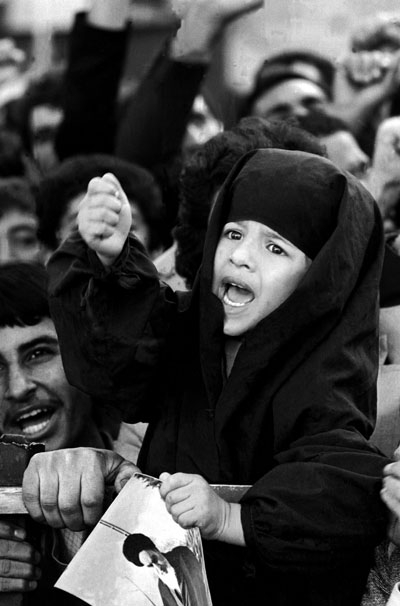Montesquieu observed that popular governments are always more vindictive than monarchies. So it proved in Iran in 1979, where the demise of a 2,000-year-old monarchical tradition made most ‘Arab spring’ revolutions seem like child’s play.
More than 30 years on, the descent of Ayatollah Khomeini from a jumbo jet, wearing an American bullet-proof vest, also remains arguably more significant. James Buchan concludes that Osama bin Laden was the extreme Sunni response to Khomeini’s clerical dictatorship; and without Khomeini, the Shias’ battle for survival would not have played out across the Middle East as violently as it has, including in Syria today.
By the end of 1982, more than 5,000 young people had been put to death in post-revolutionary purges in Iran, which still left Sadeq Khalkhali, Khomeini’s butcher-in-chief, complaining that ‘there were just so many ripe for execution who escaped me’. The terror trials included charges of ‘war against God’ and freemasonry. The country’s longest serving prime minister, Amir-Abbas Hoyveda, had been found guilty of ‘corruption on earth’ and shot in 1979. Ancient punishments such as the stoning of women and hand amputation were incorporated into Iran’s penal code.
The violence of Khomeini’s language provided clues. In one sermon in 1964, he threatened to ‘smash’ parliament up and ‘punch’ its deputies ‘in the mouth’. One cannot imagine the Archbishop of Canterbury thinking this, let alone saying it, but then the imam was not in the business of managed decline but of imposing God’s rule on earth.
Khomeini’s rise was underpinned by a centuries-old alliance between Iran’s Shia clergy and a merchant class which financed mosques, seminaries and even the chartered jumbo which flew the imam home from Paris in 1979. By contrast, Iran’s last ruling dynasty was founded by Reza Pahlavi, a former stable lad made good, who had predicted that akhundbazi (‘mullah games’) would prove the greatest challenge to his rule. His son, Shah Mohammed Reza Pahlavi, though equipped with a copy of Thucydides by the British ambassador, was to lose his very own Persian war.
Iran was so valuable to Britain that, by 1950, Anglo-Iranian (latterly BP) was paying almost three times as much into the British treasury as into the Shah’s coffers. As Buchan puts it, ‘The population of one of the world’s poorest countries helped finance not only Britain’s war effort but also its postwar welfare state.’
No wonder then that Sir Anthony Parsons, London’s last envoy to the royal court, shed tears at his last weekly meeting with the Shah, who was to pilot his own plane out over the Persian Gulf in defeat. They were tears perhaps for Britain’s post-imperial impotence too, given that most of the plotting and scheming had been ceded to Washington by then.
Buchan blames the Shah’s fall only partly on his taste for absolute power (an adviser addressed letters to him as from ‘your house-born slave’, and one political prisoner was jailed for so long that when he was released he had never heard the word ‘apartment’ before). The regime’s stuffing of prisons and shooting of demonstrators was more than matched by the ability of the Shah’s enemies to exaggerate and distort these and other crimes.
None more so than at the Rex cinema in Abadan in 1978, where arson resulted in over 400 deaths and gave Khomeini the revolutionary spark he needed. He immediately blamed government agents, though when a religious radical later confessed to the crime, the clerics drew in their skirts and blocked their ears.
Buchan’s scholarship sometimes overwhelms his prose. A bewildering array of Iranian surnames is fired at the reader even faster than diplomatic communiqués warning Tehran to desist from its nuclear programme; but this book comes alive with a wonderfully detailed and authoritative account of the Shah’s final days and the murder and mayhem that followed.
The last prime minister of imperial Iran, Chapour Bakhtiar, is depicted fleeing the country first class, disguised as a French businessman, wearing dark glasses and a small beard, with his head buried in a copy of Le Monde. It took demolition men armed with explosives three weeks to destroy the mausoleum the Shah had intended to last 1,000 years.
A mixture of pride and a persecution complex stretching back to the seventh century provides some explanation for Iran’s nuclear ambition. Tehran’s mindset sometimes seems closest to that of Tel Aviv, with this book reminding us that Americans and Jews are mere arrivistes in the pantheon of the hated.
After all, why is Iran so interested in preserving Syria’s ruling Shia elite? Because Sunni Arabs are ‘usurpers of the Holy Places’, who levelled the tombs of the Shia imams. As early as the 1940s, Khomeini was sounding off against ‘the camel-grazers of Riyadh’, and when his will was read in 1989 it began with an attack on the Saudi royal family.
Many Iranians survive by doing their best to ignore their government; we in the West can’t afford to, yet Iran remains one of the world’s most unexplained places. If there is one country to be understood better in this next year of nuclear deadlines, it is surely this one.






Comments